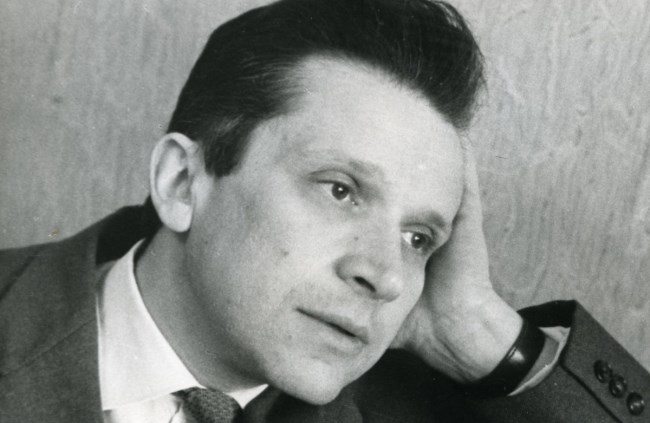Mieczysław Weinberg, Rhapsody on Moldavian Themes
By Peter Laki
Born December 8, 1919, in Warsaw, Poland
Died February 26, 1996, in Moscow, Russia
Composed in 1949
Premiered on November 30, 1949, in Moscow by the All-Union Radio Symphony Orchestra conducted by Alexander Gauk
Performance Time: Approximately 12 minutes
During the last decade or so, a true Mieczysław Weinberg renaissance has begun in the concert halls of the world. Weinberg, who fled the Nazis from Poland to the Soviet Union and spent most of his life in Moscow, composed seven operas, 22 symphonies, 17 string quartets, and more than 100 other works, large and small, in just about every possible genre of classical music. He was a close friend and frequent duo-piano partner of Shostakovich, who thought the world of him. During his lifetime, Weinberg’s music was performed by the greatest musicians in the Soviet Union and he received numerous awards, but, except for a single visit to his native Poland, he never travelled abroad and his work was, for many years, a well-kept secret outside the country.
Weinberg was born in Warsaw to parents who were originally from Bessarabia, the present-day Republic of Moldova. His father was a violin player and composer working for Jewish theater troupes in Bessarabia before migrating to Poland, where he and his wife raised their two children. With the exception of Mieczysław, who escaped in time, his parents and his sister were murdered by the Nazis after the invasion of Poland.
The Soviet Communist Party always urged composers to use melodies from the country’s various ethnic traditions. It was natural for Weinberg to turn to Moldavia, his parents’ birthplace, which had been annexed by the Soviet Union in 1940, the year after Weinberg’s flight from Poland. (The region had been part of the Russian Empire before the revolution, although most of it belonged to the Kingdom of Romania during the interwar years).
Obeying political directives was more vital than ever in 1949, one year after an infamous Party resolution had not only harshly denounced but physically threatened the country’s most famous composers. Weinberg, only 29 at the time, was too young to be singled out for censure, but he was implicitly included in the ranks of the condemned “formalists.” And in his case, the general calamity had been compounded by an even more disastrous event involving his immediate family: in January 1948 his father-in-law, the famous Yiddish actor Solomon Michoels, was murdered in Minsk on direct orders from Stalin. It was under such historical circumstances that the Rhapsody on Moldavian Themes was written.
The Rhapsody strings together a number of folk songs from Moldavia, a country that is culturally and linguistically very close to Romania. Most of the melodies Weinberg used belong to the majority population, but the fiery final section is an unmistakable Jewish klezmer dance tune. According to a 1903 statistic, the inhabitants of Moldavia’s capital, Chișinău (Kishinev), were almost 50% Jewish. That year, a devastating pogrom took place in the town, with 49 dead and 1,500 homes damaged. It is hard to imagine that Weinberg should not have thought of that tragedy, at least secretly, when he composed this brilliantly orchestrated work that contributed significantly to his growing reputation in Moscow.
Peter Laki is Visiting Associate Professor of Music at the Bard College Conservatory of Music.

